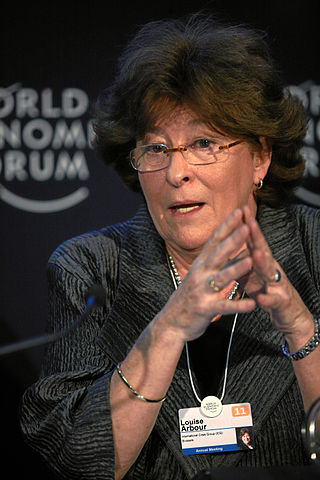Islamic feminism is a form of feminism concerned with the role of women in Islam. It aims for the full equality of all Muslims, regardless of gender, in public and private life. Islamic feminists advocate women's rights, gender equality, and social justice grounded in an Islamic framework. Although rooted in Islam, the movement's pioneers have also utilized secular, Western, or otherwise non-Muslim feminist discourses, and have recognized the role of Islamic feminism as part of an integrated global feminist movement.
Maxine Deirdre Molyneux is a sociologist whose work focuses on the women's movement.
Polygamy in Pakistan is legally permissible according to the law of 1961, but restricted. Only males adhering to the Islamic faith are legally allowed to enter into polygamous unions, with a maximum of four wives at one time. Legally, only Muslim citizens are allowed to enter Polygamous marriage. However it is illegal for Hindus as per the Hindu marriage law.

sister-hood is an international platform for the voices of women of Muslim heritage founded in 2007 by Norwegian, film-maker and human rights activist Deeyah Khan through her media and arts production company Fuuse.

The Association for Women's Rights in Development (AWID), formerly the Association for Women in Development, is an international feminist membership and movement support organization committed to achieving gender equality, sustainable development and women's human rights. It was established in 1982 as a U.S.-based association focused on promoting dialogue on women in development issues among academics, policy makers and development professionals. AWID stands for a progressive intersectional feminism, and works to defend the international and regional human rights systems. The co-executive directors are Hakima Abbas and Cindy Clark.
Women's Action Forum (WAF) is a women's rights organization in Pakistan.

KamalaChandrakirana is a feminist human rights activist for justice and democracy from Indonesia. She has been a member of the United Nations Working Group on discrimination against women in law and practice since 2011. She spent over a decade founding and serving Indonesia's National Commission on Violence Against Women, the country's primary mechanism for women's human rights. She was first Secretary General from 1998 to 2003, then Chairperson from 2003 to 2009. In 2009, she co-founded Musawah, a "global movement for equality and justice in the Muslim family", with other activists, academics and progressive religious scholars.

Rashida Manjoo is an Emeritus Professor at the University of Cape Town in Cape Town and a social activist involved in the eradication of violence against women and gender-based violence. Manjoo was the United Nations' Special Rapporteur on Violence Against Women from June 2009 to July 2015.

Women in law describes the role played by women in the legal profession and related occupations, which includes lawyers, paralegals, prosecutors, judges, legal scholars, law professors and law school deans.
Najma Sadeque from Pakistan was a leading woman journalist, author, human rights activist, particularly of women's rights, an artist, an environmentalist, and a painter. She also did research on socioeconomic issues and authored many books and wrote articles. She co-founded Shirkat Gah in 1975, a women's NGO to highlight human rights violations against women. She also co-founded the Women’s Action Forum (WAF), Pakistan.
Feminism in Pakistan refers to the set of movements which aim to define, establish, and defend the rights of women in Pakistan.This may involve the pursuit of equal political, economic, and social rights, alongside equal opportunity. These movements have historically been shaped in response to national and global reconfiguration of power, including colonialism, nationalism, Islamization, dictatorship, democracy, and the War on Terror. The relationship between the women's movement and the Pakistani state has undergone significant shifts from mutual accommodation to confrontation and conflict.

Khawar Mumtaz is a Pakistani women's rights activist, author and university lecturer. She is the Former Chairperson of the National Commission on the Status of Women (NCSW) who served for two consecutive terms from 2013 to 2019.
Women human rights defenders (WHRDs) are women who defend human rights, and defenders of all genders who defend the rights of women and rights related to gender and sexuality. Their work and the challenges they face have been recognized by a United Nations (UN) resolution in 2013, which calls for specific protection for women human rights defenders.
Hilda Saeed is a Pakistani activist and freelance journalist. She is chair of Shirkat Gah and a founding member of the Women's Action Forum (WAF) in Pakistan and of the Pakistan Reproductive Health Network.
Kamar Jehan Sekandra Begum, better known as Begum Dolly Azad, was an East Pakistani politician.
Yakin Ertürk is a Turkish former United Nations special rapporteur on violence against women and board member of the United Nations Research Institute for Social Development (UNRISD), and was a professor of Sociology.
Zohra Yusuf is an advertising professional, an activist and a journalist who is lauded for her work in women's rights, human rights and media. She is the former Chairperson of the Human Rights Commission of Pakistan (HRCP).
Aisha Gazdar is a Pakistani journalist, writer, filmmaker and a researcher for documentaries. She is known for her award-winning film: The Honor Deception. She is the daughter of Mushtaq Gazdar.
Shirkat Gah women's resource centre, is a women's rights organization in Pakistan which focuses on research, publications and advocacy on women's issues.
Cassandra Marlin Balchin was a British journalist and women's rights campaigner.






